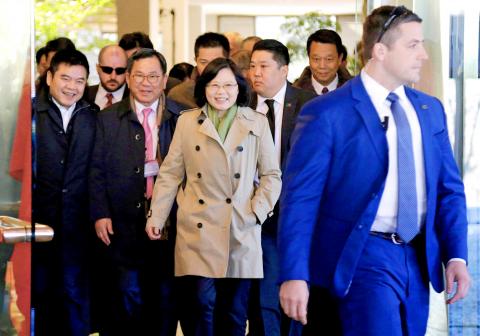President Tsai Ing-wen (蔡英文) on Saturday arrived in Houston for a brief transit stop on her way to Central America, a routine stopover that has been closely watched by Beijing after US president-elect Donald Trump spoke with her by telephone early last month.
Tsai touched down in Houston after setting out from Taiwan earlier in the day on her way to Honduras, the first leg of a nine-day trip. She is also to visit to Nicaragua, Guatemala and El Salvador, in that order.
Tsai was met at the airport by US Representative for Texas Blake Farenthold, American Institute in Taiwan Chairman James Moriarty and Taiwan’s Representative to the US Stanley Kao (高碩泰).

Photo: Reuters
The US Bureau of Diplomatic Security adopted high-level security measures for Tsai’s stopover.
When Tsai visited Houston’s Museum of Fine Arts, traffic controls were imposed, and police officers escorted her, while the museum was cleared for three hours.
Tsai also visited a Formosa Plastics Corp (台灣塑膠) facility in Point Comfort and a Nan Ya Plastics Corp (南亞塑膠) facility in Wharton. She was accompanied by Farenthold.
Tsai is scheduled to stay in Houston for one night after attending a dinner in her honor which is to be attended by several US officials, including Farenthold, US Representative for Texas Al Green, Moriarty and about 600 expat Taiwanese.
Moriarty was quoted by a Democratic Progressive Party legislator as saying that he would continue to promote good relations between Taiwan and the US, as the two nations share common values.
The Houston stop has taken on a new significance since Tsai’s telephone call with Trump last month. It was the first reported telephone call between a Taiwanese president and a US president or president-elect since 1979.
Tsai is scheduled to make a stopover in San Francisco on Jan. 13, after leaving El Salvador on her way back to Taiwan.
It is Tsai’s second overseas trip since taking office on May 20 last year. Tsai visited Panama in June last year.

MAKING WAVES: China’s maritime militia could become a nontraditional threat in war, clogging up shipping lanes to prevent US or Japanese intervention, a report said About 1,900 Chinese ships flying flags of convenience and fishing vessels that participated in China’s military exercises around Taiwan last month and in January have been listed for monitoring, Coast Guard Administration (CGA) Deputy Director-General Hsieh Ching-chin (謝慶欽) said yesterday. Following amendments to the Commercial Port Act (商港法) and the Law of Ships (船舶法) last month, the CGA can designate possible berthing areas or deny ports of call for vessels suspected of loitering around areas where undersea cables can be accessed, Oceans Affairs Council Minister Kuan Bi-ling (管碧玲) said. The list of suspected ships, originally 300, had risen to about 1,900 as

Right-wing political scientist Laura Fernandez on Sunday won Costa Rica’s presidential election by a landslide, after promising to crack down on rising violence linked to the cocaine trade. Fernandez’s nearest rival, economist Alvaro Ramos, conceded defeat as results showed the ruling party far exceeding the threshold of 40 percent needed to avoid a runoff. With 94 percent of polling stations counted, the political heir of outgoing Costa Rican President Rodrigo Chaves had captured 48.3 percent of the vote compared with Ramos’ 33.4 percent, the Supreme Electoral Tribunal said. As soon as the first results were announced, members of Fernandez’s Sovereign People’s Party

Japan’s strategic alliance with the US would collapse if Tokyo were to turn away from a conflict in Taiwan, Japanese Prime Minister Sanae Takaichi said yesterday, but distanced herself from previous comments that suggested a possible military response in such an event. Takaichi expressed her latest views on a nationally broadcast TV program late on Monday, where an opposition party leader criticized her for igniting tensions with China with the earlier remarks. Ties between Japan and China have sunk to the worst level in years after Takaichi said in November that a hypothetical Chinese attack on Taiwan could bring about a Japanese

MORE RESPONSIBILITY: Draftees would be expected to fight alongside professional soldiers, likely requiring the transformation of some training brigades into combat units The armed forces are to start incorporating new conscripts into combined arms brigades this year to enhance combat readiness, the Executive Yuan’s latest policy report said. The new policy would affect Taiwanese men entering the military for their compulsory service, which was extended to one year under reforms by then-president Tsai Ing-wen (蔡英文) in 2022. The conscripts would be trained to operate machine guns, uncrewed aerial vehicles, anti-tank guided missile launchers and Stinger air defense systems, the report said, adding that the basic training would be lengthened to eight weeks. After basic training, conscripts would be sorted into infantry battalions that would take